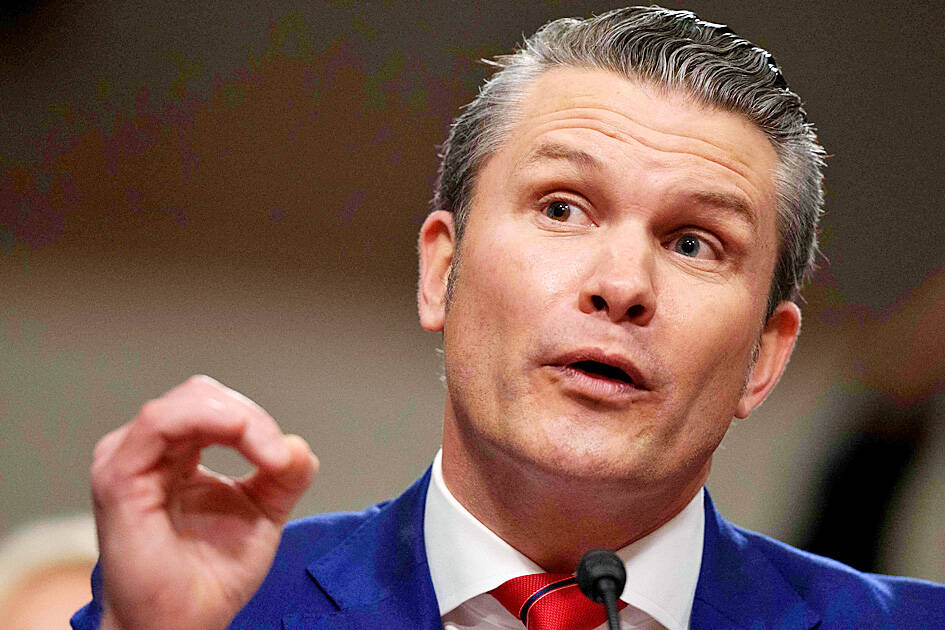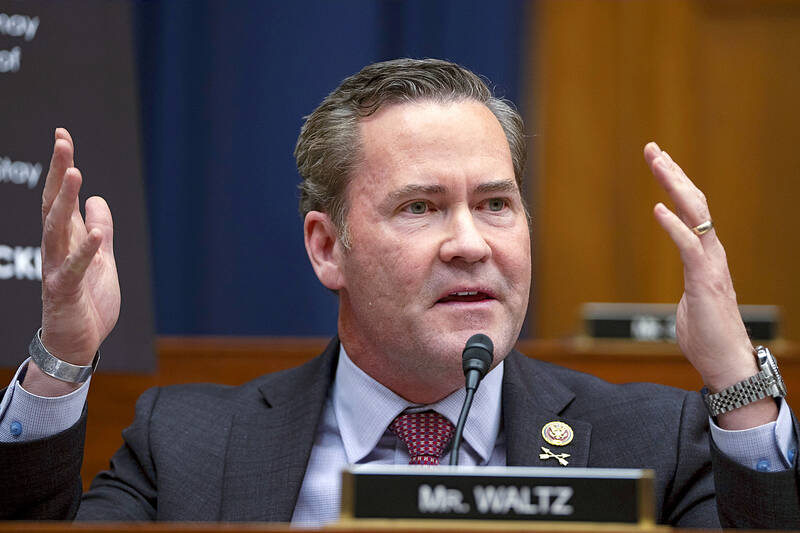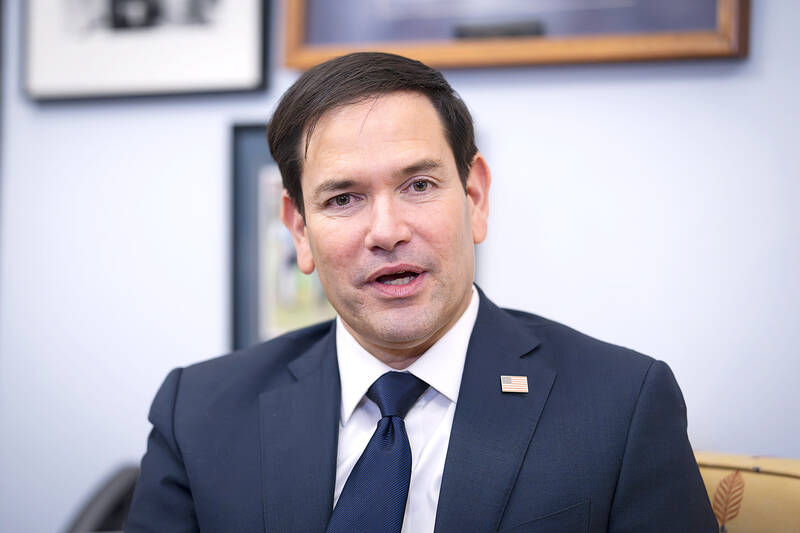US president-elect Donald Trump’s nominee for US secretary of defense, Pete Hegseth, affirmed his commitment to peace in the Taiwan Strait during his confirmation hearing in Washington on Tuesday.
Hegseth called China “the most comprehensive and serious challenge to US national security” and said that he would aim to limit Beijing’s expansion in the Indo-Pacific region, Voice of America reported.
He would also adhere to long-standing policies to prevent miscalculations, Hegseth added.

Photo: AFP
The US Senate Armed Services Committee hearing was the first for a nominee of Trump’s incoming Cabinet, and questions mostly focused on whether he was fit for the position and prior comments made as a Fox News television host.
Hegseth submitted a 75-page report to the committee on Monday last week, which provided a more detailed explanation on his views on China and Taiwan.
In it, he said that “the United States can help prevent miscalculation by maintaining our longstanding policy in support of peace and stability across the Taiwan Strait.”

Photo: AP
Asked if the US should explicitly state its reaction to Chinese use of force against Taiwan, he said that “the United States presently maintains its longstanding commitments as outlined in the Taiwan Relations Act, three communiques and the six assurances. If confirmed, I will review our current posture with the president and other national security leaders, and meet with the committee in a classified session to discuss further.”
Regarding the state of US-China military relations, he said that such dialogue “can be useful in reducing miscalculation and misperception.”
“Intent, however, may not be accurately conveyed by dialogue. Chinese Communist Party actions will always speak louder than their words,” he said.

Photo: AP
Separately, US Representative Mike Waltz, the incoming national security adviser for Trump, on Tuesday said he wants to speed up deliveries of weapons purchased by Taiwan to deter threats from China.
“We have over a US$20 billion backlog of things that they’ve paid for and that we need to work hard to free up and have them get what they paid for as a deterrent,” Waltz said at an event in Washington.
Meanwhile, US Senator Marco Rubio was expected to say China has lied and cheated its way to superpower status at the expense of the US, according to remarks he was to deliver at his confirmation hearing for secretary of state yesterday.
Rubio was expected to call for the US to put its “core national interests above all else once again” as it works to “create a free world out of chaos,” according to the remarks.
“We welcomed the Chinese Communist Party into this global order,” Rubio was expected to say. “And they took advantage of all its benefits, but they ignored all its obligations and responsibilities. Instead, they have lied, cheated, hacked and stolen their way to global superpower status, at our expense.”
The comments amount to a summing up of Rubio’s worldview. He would say voters chose Trump, because they want a strong US that promotes peace abroad and prosperity at home, and that would be the US Department of State’s core mission if he is confirmed.
Rubio, who has long been a member of the US Senate Foreign Relations Committee that is examining his nomination, is expected to face little opposition from Republicans or Democrats in his confirmation process.
Additional reporting from Reuters and Bloomberg

A magnitude 5.6 earthquake struck off the coast of Yilan County at 12:37pm today, with clear shaking felt across much of northern Taiwan. There were no immediate reports of damage. The epicenter of the quake was 16.9km east-southeast of Yilan County Hall offshore at a depth of 66.8km, Central Weather Administration (CWA) data showed. The maximum intensity registered at a 4 in Yilan County’s Nanao Township (南澳) on Taiwan’s seven-tier scale. Other parts of Yilan, as well as certain areas of Hualien County, Taipei, New Taipei City, Taoyuan, Hsinchu County, Taichung and Miaoli County, recorded intensities of 3. Residents of Yilan County and Taipei received

Taiwan has secured another breakthrough in fruit exports, with jujubes, dragon fruit and lychees approved for shipment to the EU, the Ministry of Agriculture said yesterday. The Animal and Plant Health Inspection Agency on Thursday received formal notification of the approval from the EU, the ministry said, adding that the decision was expected to expand Taiwanese fruit producers’ access to high-end European markets. Taiwan exported 126 tonnes of lychees last year, valued at US$1.48 million, with Japan accounting for 102 tonnes. Other export destinations included New Zealand, Hong Kong, the US and Australia, ministry data showed. Jujube exports totaled 103 tonnes, valued at

TRUST: The KMT said it respected the US’ timing and considerations, and hoped it would continue to honor its commitments to helping Taiwan bolster its defenses and deterrence US President Donald Trump is delaying a multibillion-dollar arms sale to Taiwan to ensure his visit to Beijing is successful, a New York Times report said. The weapons sales package has stalled in the US Department of State, the report said, citing US officials it did not identify. The White House has told agencies not to push forward ahead of Trump’s meeting with Chinese President Xi Jinping (習近平), it said. The two last month held a phone call to discuss trade and geopolitical flashpoints ahead of the summit. Xi raised the Taiwan issue and urged the US to handle arms sales to

BIG SPENDERS: Foreign investors bought the most Taiwan equities since 2005, signaling confidence that an AI boom would continue to benefit chipmakers Taiwan Semiconductor Manufacturing Co’s (TSMC, 台積電) market capitalization swelled to US$2 trillion for the first time following a 4.25 percent rally in its American depositary receipts (ADR) overnight, putting the world’s biggest contract chipmaker sixth on the list of the world’s biggest companies by market capitalization, just behind Amazon.com Inc. The site CompaniesMarketcap.com ranked TSMC ahead of Saudi Aramco and Meta Platforms Inc. The Taiwanese company’s ADRs on Tuesday surged to US$385.75 on the New York Stock Exchange, as strong demand for artificial intelligence (AI) applications led to chip supply constraints and boost revenue growth to record-breaking levels. Each TSMC ADR represents